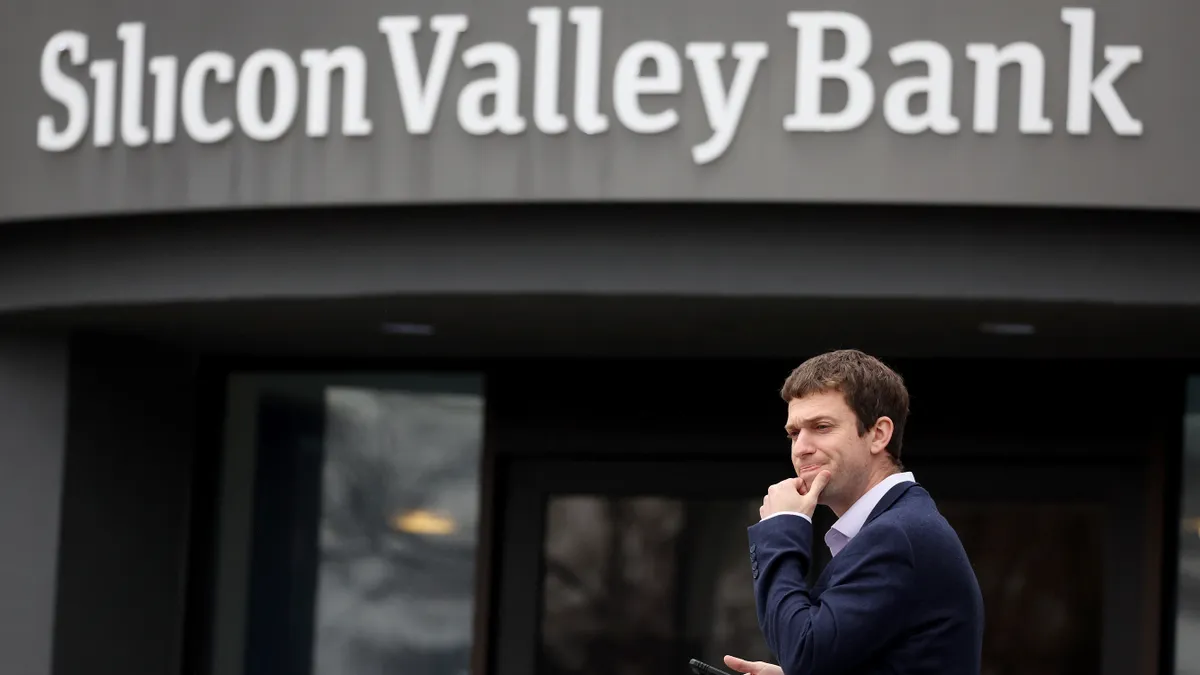When rumblings of a potential shutdown of Silicon Valley Bank started on March 9, startups and investors scrambled to draft emergency plans. The Santa Clara, Calif.-based bank, which had $209 billion in assets, was a significant lender for healthcare and medical device startups.
The trouble started when SVB tried to raise capital after posting a loss of about $2 billion in the sale of U.S. treasuries and mortgage-backed securities, and as rumors began to swirl that the bank was seeking a buyer. By March 10, California regulators took over the firm’s deposits. Shortly after, Signature Bank, a New York-based regional bank, closed.
“The advice that we gave is that we believe SVB as an institution is stable, but that there’s a lot of risk based on the group psychology, and it’s prudent to diversify where you bank so you are able to meet your obligations,” said Elena Viboch, a partner with General Catalyst, a Cambridge, Mass.-based VC firm that invests in healthtech, finance and software companies.
“We reached out to every company and just asked them, what are your needs? Where are you banking and what do you project in terms of payroll? And we were prepared to make loans for our companies,” Viboch said.
General Catalyst was prepared to make short-term loans to the roughly 10% of its portfolio companies that were at risk of not making payroll, added Vice President of Communications Sue Kwon.
The day SVB was seized, General Catalyst CEO Hemant Taneja published a letter of support for the bank that has since been signed by 668 VC firms, pledging to encourage their portfolio companies to remain SVB customers if the bank is rescued.
In addition to providing sweetened deals to startups that housed their cash at SVB, the bank also played a key role as a connector.
“They connect companies to each other; they really are an institution in the startup network,” Viboch said.
Bridge term sheets
Flare Capital Partners, a VC firm that invests in early-stage healthcare technology companies and also a signee of the letter, began meeting with portfolio companies to inventory their banking relationships. For those that were most affected, they started to put together “super fast bridge term sheets” to be able to pay their employees, said Michael Greeley, the firm’s co-founder and general partner.
After a few uncertain days, the U.S. Treasury, the Federal Reserve, and the Federal Deposit Insurance Corp. assured depositors they would be able to get their money back.
“There was a collective sigh of relief,” Greeley said.
With the immediate crisis averted, it will take time to learn the full impact on medtech startups. Some investors expect a return to business as usual, while others said the effects of the shutdown may linger for months.
“SVB has been a great partner and investor for us over the last few years, and like many in the venture-backed health-tech community, we're disheartened to see all that's happened over the last few day,” Matthew Stoudt, CEO of AppliedVR, a digital therapeutics startup using virtual reality for pain management, said in an email. “Losing such a great organization, whose team was willing to go the extra mile for entrepreneurs, will naturally have an impact on the broader innovation ecosystem, but only time will tell how big that impact will be.”
Working with multiple banks
Going forward, General Catalyst’s Viboch expects startups to diversify, maintaining relationships with two or three banks, depending on their cash balance.
“It’s prudent. It’s a way to manage risk,” Viboch said. “That is something I think you’ll see more companies doing.”
The VC firm expects a return to “business as usual” with the same rates of company formation as well as the same rates of financing.
“People who are holding pipettes never stopped holding pipettes. People who are coding kept on coding. So it's day-to-day activities for these companies,” Viboch said.
Potential debt challenges
Not all investors are that optimistic, with Flare Capital’s Greeley forecasting that the bank shutdown will have a lingering effect on the startup ecosystem.
While the “existential crisis has passed for most of our companies,” venture debt to be difficult to raise for the next three to four months, Greeley said.
Part of that is because SVB had standardized the process, so term sheets were generally similar, he added.
“There was a level of comfort and familiarity,” Greeley said. “Now that whole capability is being transferred to new institutions. Some of them may not understand biotech, may not understand medtech, may not understand early stage.”
In addition, some banks may decide not to work in this part of the market and larger lenders like J.P. Morgan may not want to write loans of less than $10 million, Greeley said.
“Whoever fills that void will be relatively new to the market,” he added.
In the meantime, startups looking to raise funding will need to look to new or existing investors for equity. Greeley expects there may be smaller funding rounds and pressure to be more efficient, which is difficult in medtech because of some of the structural costs that come with finding laboratory space and hiring scientific experts.
“I don’t think this is permanent,” he added. “The markets will reopen, these are attractive companies, and they’re solving big problems.”
What will happen with SVB?
SVB’s future also may have a hand in shaping the financial environment for startups. The bank reopened on March 13 as Silicon Valley Bridge Bank, and is reportedly still making loans and processing payments under its FDIC-appointed CEO, according to NBC. While the lender could still be acquired, no potential buyer has emerged.
“I think it's going to be a while before the dust settles on SVB and Signature's seizures, and the outlook for their future is certain enough for startups and venture funds to finalize the decision about who their bank will be,” said Bill Evans, founder and general partner of Rock Health Capital, a VC fund that invests in early-stage healthcare technology companies.
With a relationship-driven bank like SVB, startups could open accounts and get loan applications and credit applications reviewed relatively quickly because of this network in a single sector, Evans said, adding that those same factors also made it easier for a bank run to happen.
If regulators ultimately shut down SVB and Signature, medtech founders may have a harder time selling debt, Evans said. Still, he doesn’t expect it to affect startups raising equity.
“It's a little too early to say for sure how this is going to play out,” Evans added. “In the short term, it's not good. In the long term, it might improve.





















